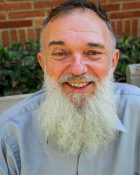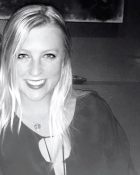
Calvin Normore

Ally Peabody
Calvin Normore, professor at UCLA since 1996, has just been named the first Brian P. Copenhaver Professor. His research focuses on medieval and early modern philosophy, the history of logic, and political philosophy, and he is currently working on a book manuscript entitled Descartes’ Ontology of Everyday Life, co-authored with Deborah Brown. He was interviewed by Ally Peabody. Ally is a second-year student in the Department of Philosophy. She is particularly interested in ethical, meta-ethical, and ontological questions involving moral standing.
AP: What brought you to philosophy and what made you want to become a professional philosopher?
I grew up in a small town in Newfoundland, but it was the biggest town for a good distance around. There were no bookstores, but there were two drugstores that had little revolving racks of books and there was a public library. I was going to a Roman Catholic high school so I knew there was such a thing as philosophy from school. In the drugstores I found two books, one was Jacques Maritain’s A Preface to Metaphysics and the other was a collection of selections from Aristotle. I brought them home, and I didn’t understand either of them but I could tell that these were heavy-duty stuff on first reading. At the public library I found a couple of things of Bertrand Russell’s including his Why I’m Not a Christian and parts of his autobiography, and I read those and I decided “OK, I want to be Bertrand Russell.” And so I set out to be Bertrand Russell. When I went up to university I wanted to do math and philosophy. But I had the following relationship to math: I liked having done it but I didn’t actually like doing it that much. Whereas the philosophy I liked actually doing, so I moved more over into philosophy. But I didn’t intend to become a pro at all. I think the thought never crossed my mind in those days. Even when I was in graduate school, for a lot of my fellow graduate students at that time, being an academic wasn’t what they wanted to do particularly. So that all came much later, by accident again.
AP: Can you tell me a bit about your career trajectory, where you did your graduate studies, and how you wound up here?
In my senior year as an undergraduate, at McGill, John Trentman gave a seminar on John Buridan’s Sophisms on Meaning and Truth. In the course of that seminar I got introduced to the work of Arthur Prior. And Prior said that there was interesting modal and tense logic to be found in the medievals. So I decided I’d study the medievals, and the best place to do medieval at the time was the University of Toronto. But the year I arrived I fell in with young faculty members who weren’t doing medieval. … I basically was working on contemporary stuff for the first while but then slowly got back into the medieval stuff. Hans Herzberger agreed to supervise my dissertation and so I did that.
In my second to last year as a graduate student, York University suddenly needed a fill-in so they hired me. I taught there for two years, before I finished my Ph.D., and it was grueling. I’d go in at eight in the morning and I’d just hang with the students til six in the evening, go home, write lectures, and come in and do it again the next day. After two years of that, I didn’t think I could manage it so I decided to become a computer jock. I got a postdoc at the University of Alberta, and I went out not intending to do any more philosophy, really, but to re-tool as a computer guy. My supervisor said “OK I’ll support all of this but you’ve got to let me put you in for one academic job.” So he put me in for a job at Princeton. After they looked at the application, my supervisor told me, “The people at Princeton don’t think you’re a scholar.” This really pissed me off. So I took a paper that I had done when I was a graduate student and I put it in an envelope and sent it with a very short note saying something like, “You might be interested in this.” And then five months later they called me up and offered me the job.
AP: What do you like about being at UCLA, what do you think is unique about the department and the culture here?
The thing I love most about UCLA is that I’ve always thought that anything is possible. You come up with an idea; you can make it happen. It’s that sense of open possibility that really excites me.
AP: Can you tell me what you like the most about medieval philosophy? What’s exciting about it to you?
Remember I got into medieval because I’d discovered that Prior thought that it was an interesting moment in modal logic, and that’s what I ended up writing my dissertation on. The more medieval philosophy I read, particularly the people of the fourteenth century—people like Scotus, Ockham, Gregory of Rimini, John Buridan—the more they seemed to resonate; in a way the earlier medievals and later folk didn’t seem quite on the same wavelength as what was happening in philosophy when I was a young scholar, but these medievals did. So I didn’t get into it to do history, I got into it to do philosophy, and these folks seemed to me to be doing crackerjack, first-rate philosophy of a kind I recognized.
AP: When you decide to write a book or an article, how do you decide what you want to write about? Do you come across it in teaching?
Sometimes, I write it because somebody wants me to write it. But typically, what happens is when I finish something, a there’s some bit of it that’s not worked out yet, that seems not right to me. So that just sort of nags at me for a while, and then if there’s an opportunity, to say give a talk or something like that I’ll say “Ah this gives me a chance to work on that.” So I’ll announce a title for a paper that doesn’t exist, then I’ll have to write the paper to fit that title.
AP: Do you enjoy doing kind of extracurricular reading, like non-fiction, fiction, and if so what have you been reading lately?
I’m reading less extracurricular material than I used to. I used to be a kind of encyclopedic science fiction reader. Many years ago I lived in a building in Toronto that was then called Rochdale College, it was a quite exceptional place. You can Google it and see why. Judith Merril, who was a science fiction writer and editor, was living there and she used to put together an annual anthology of science fiction. For a while I read almost all of the major and even minor science fiction that was coming out. More recently I haven’t been interested in doing that so much, but there are couple science fiction writers whom I try to follow pretty religiously which are Richard Morgan and Hannu Rajaniemi.
AP: What is some advice you might have for an undergrad who’s interested in majoring in philosophy or continuing to study philosophy at the graduate level? And what’s some good advice you received during your academic training?
I think the most important thing is to do what you really love. Because particularly now, it’s harder than it was when I was a student and a young faculty member. I had a colleague for a while, who had two sayings, one of which I thought was completely true and the other which I thought was completely false. So the one I thought was . . .
AP: Don’t tell me which one is which!
I’ll tell you what the two are . . . one of them was “Publish early and often,” and the other was “There’s room in philosophy for words other than last words.”
AP: So the completely false one is “Publish early and often,” which kind of goes along with the whole UCLA ethos.
That’s part of what I love about UCLA. I love the idea that there is room in philosophy for words other than last words. I mean you’re engaged in an ongoing discussion with people, you have to put your side of a discussion out there, a conversation, not just the end product of the conversation. So that’s an important thing to keep in mind—lots of people get writing blocks of one kind or another, and the writing blocks are often not writing blocks, they’re blocks about saying something that you might have to take back.
AP: It’s almost like by putting it on paper you’re committing yourself to it and that’s not how it actually needs to be. It is okay to be wrong sometimes and to change your mind.
That’s right. I mean some of the greatest philosophers of the twentieth century are notorious for it.
AP: Is there anything that I haven’t asked you that you wished I had? Any last words—even though we have just learned that we don’t need to have a last word.
I think there is something. As I was saying, I got into academic life by a kind of accident, but I didn’t get into philosophy by an accident. That is, from those early days in Corner Brook, philosophy seemed like what I really wanted to do. But the business of being an academic didn’t seem obvious. And I think people should keep in mind that philosophy is not fundamentally an academic matter. There are lots and lots of ways you can do philosophy, and being an academic is just one of them. And there are lots of things that philosophy helps you do besides teaching. So one shouldn’t think that studying philosophy is like studying engineering or something. Or perhaps even engineering isn’t even a good example of this, but it’s not vocational training, it’s something else, and it’s important to keep that in mind. I was looking at a website yesterday, a Canadian website in which they were talking about the advantages of tertiary education, because this is now becoming a debate again in Canada. And the question was besides the private advantages in terms in increased income, what does it give you? And they were discovering all kinds of strange things. For example, we live longer. Who would have thought it, right? So who’d have thought that philosophy was a path to a long life? Nonetheless it turns out there are all these correlations because I think one thinks about how to live well. Maybe occasionally one takes one’s own advice.

